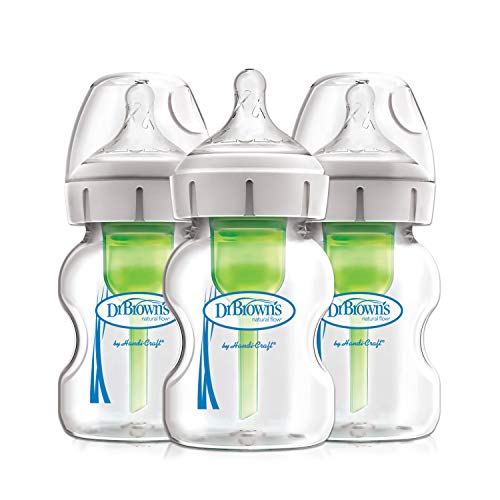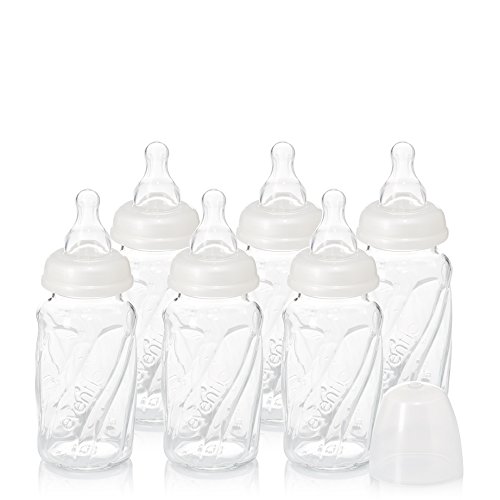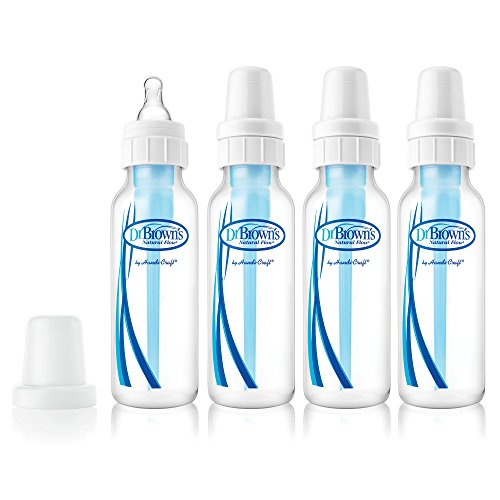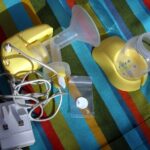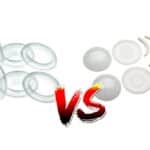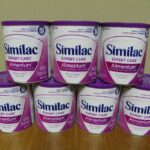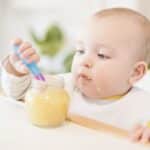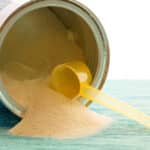No matter how prepared we think we are as parents, it’s always an interesting ride full of twists and turns.
Many parents have decided that they’re going to be using bottles to feed their babies and think that they have all the feeding issues sorted.
But there’s always more to bottle-feeding than first appears, so to begin with have you thought about what bottles you are going to use and I don’t mean the brand.
What I mean is what material are your bottles of choice going to be made from? Bet you didn’t even know there was a choice of materials – yip there definitely is glass, plastic, silicone, stainless steel…
Ok, I know you are now feeling completely overwhelmed and that the research you have done is just not going to hit the mark. But do not worry because we have the research for you.
Below are the pros and cons of both glass and plastic bottles, we have also included some of the best options for each material.
Glass Baby Bottles
Pros
No Chemicals
Glass bottles contain no harmful chemicals so there are no concerns about BPA, or chemicals from the plastic leaking into your baby’s milk.
Easier To Clean
Glass, in general, is much easier to clean than plastic as it does not develop scratches that can potentially hold odors and residue.
These small scratches that commonly occur in plastic are the perfect breeding ground for bacteria to grow. And unlike plastic that often clouds over making it difficult to see if they are actually clean.
View in gallery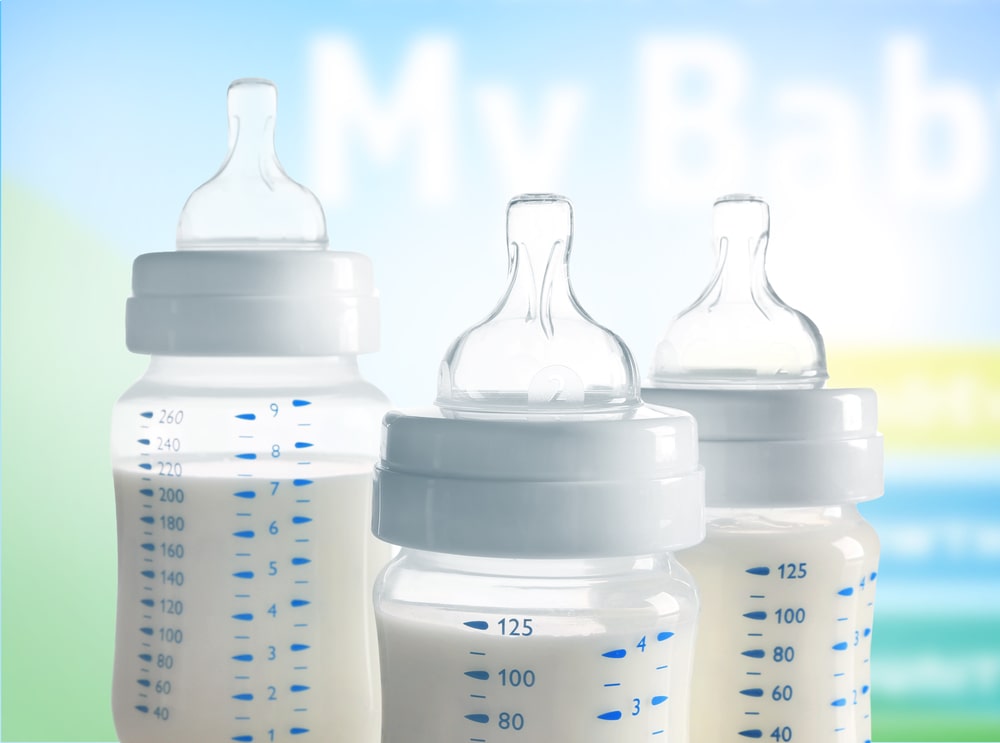
Sterilization
Glass can be heated to very high temperatures without any concerns about melting, so glass bottles are truly clean.
Taste
Glass bottles will not tarnish and hold a smell that can transfer to milk as plastic bottles often do.
Compatibility
Glass bottles are for the most part the same size as their plastic counterparts so there is no reason that they will not fit your usual breast pump.
Durable
Glass bottles are far more durable and can last for many years. This makes them a good option for a reusable container and if you are concerned about plastic and its environmental impact.
Glass also lends itself nicely to recycling which again boosts its environmental credentials.
Cons
Expensive
Glass bottles are not as budget-friendly as plastic ones, but there are genuine reasons for this. For one glass is a far more expensive material to produce and the process of making them is far more time-consuming.
Availability
Glass bottles are not something that you will be able to pick up at your local grocery store and you may need to look online to find the best range and value available to you.
This does mean that if you ever need to buy new bottles in a hurry you may have issues sourcing them locally.
Options
Not every brand that makes plastic bottles also makes a glass version so you will be limited there. But most of the bigger brands do now have a glass alternative.
You will find brands such as Lifefactory, Avent, Dr. Brown’s, and Evenflo are all readily available on Amazon.
Weight
Glass bottles are usually heavier than plastic but that is kind of expected from this type of material. But this is a factor that you need to take into consideration as it could pose potential problems for your baby to hold.
Chance of breakage
Many glass bottles also come with silicone sleeves which can significantly reduce the chances of breaking, it will also help to contain the shattered glass if a breakage does occur.
Many brands of glass bottles use glass that is reinforced to limit the chance of breakages.
Plastic Baby bottles
View in gallery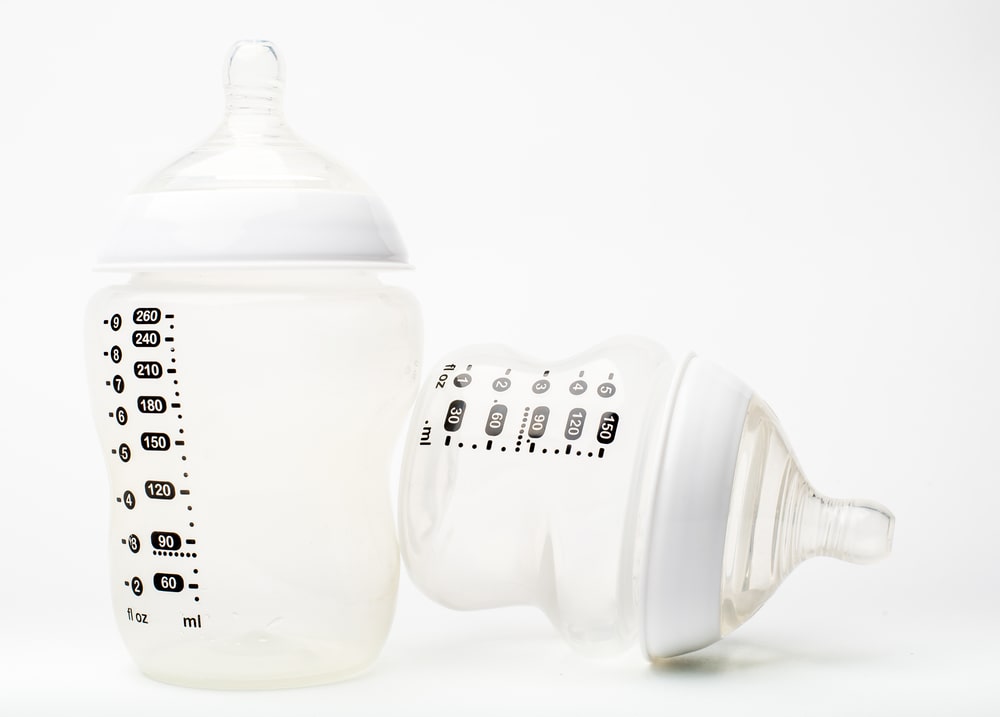
Pros
Availability
Plastic bottles in a variety of sizes, brands, and colors are available in a huge amount of large stores such s Target and Walmart. But they are also available in smaller stores and of course are readily available online.
Budget-Friendly
Generally, plastic bottles are a little more budget-friendly. The material is cheaper to make and the process is less time-consuming.
Lightweight
Plastic is lightweight by design and this makes it easier for babies to handle as they get older.
Durability
Plastic bottles are durable and they can certainly take the knocks and bumps that they will inevitably have to survive. But they do not last as long as glass bottles.
Cons
Chemical Content
The vast majority of plastic bottles are now BPA free but they still contain other chemicals that could potentially have damaging effects on children’s health.
One of the issues with plastic especially is that when it is heated many of these chemicals leach into the milk and then enter the body through this liquid.
Cleaning
Plastic is prone to developing scratches that are the perfect breeding ground for bacteria. They also make cleaning the bottles very difficult.
Sanitizing
Although plastic bottles can be sterilized using various methods such as steam. They can not be heated to the same sort of extreme temperatures that glass bottles can.
If they are exposed to very high temperatures, there is the risk of warping and even melting.
Odors
Plastic is known for absorbing odors, you know what happens to plastic containers when you store something like spaghetti bolognese in them.
They retain the color and odor from the bolognese and they are impossible to get back to their original color. The same thing happens to plastic baby bottles they will eventually absorb the odor from the milk and take on an unpleasant smell.
Durability
Plastic bottles although more durable in some cases are generally not as long-lasting as glass bottles. They are far more likely to develop scratches and to discolor meaning that they will need to be replaced more often than glass bottles.
Top 3 Glass Bottles
Glass bottles offer parents an alternative to the standard plastic bottles. They also look new throughout all the baby bottle years and way beyond. Here are some of the top glass baby bottles on the market.
1. Philips Avent Natural Glass Bottles
This is an incredibly popular brand for both plastic and glass bottles. The reason being is that they make everything super simple for parents with as few parts as possible.
Their anti-colic system is built into their bottles so no fiddly extra parts required. These glass bottles can also grow and adapt with your baby, as they have four stage natural latch nipples that increase milk flow to keep up with their pace.
Another great plus of these glass bottles is that they are made with pharmaceutical-grade borosilicate glass that is both heat and thermal shock resistant.
This means that bottles can go from the fridge to a container of warm water, and be sterilized in boiling water.
Pros
- Easily adapt to a growing baby
- Made with pharmaceutical-grade borosilicate glass
- Built-in anti-colic system – no extra parts required.
Cons
- Some issues with lids popping off
- Some issues reported leaking problems
[amalinkspro type=”cta-btn-css” ctabtn-id=”” asin=”” apilink=”https://www.amazon.com/dp/B07CJHBYJ3?tag=mominformedcom-20&linkCode=osi&th=1&psc=1″ addtocart=”false” new-window=”true” nofollow=”true” alignment=”aligncenter”]Buy on Amazon[/amalinkspro]
2. Dr. Brown’s Options Wide Neck Glass Bottles
If you have a baby that suffers from colic any Dr. Brown’s bottles are a good bet. They come with a patented vent system that helps keeps air out of your baby’s tummy which means a happy, colic-free little one.
These bottles will also grow with your baby as the vent can be removed to adapt to your baby’s development.
Pros
- Come with a patented vent system to help reduce colic
- The vent can be removed as your baby grows
- Silicone sleeves are available for easier grip.
Cons
- Issues with bottles chipping
- Disappointing customer services
- Some issues with leaking where the nipple meets the plastic ring.
[amalinkspro type=”cta-btn-css” ctabtn-id=”” asin=”” apilink=”https://www.amazon.com/dp/B07M6QQP9Z?tag=mominformedcom-20&linkCode=osi&th=1&psc=1″ addtocart=”false” new-window=”true” nofollow=”true” alignment=”aligncenter”]Buy on Amazon[/amalinkspro]
3. Evenflo Feeding Glass Vented Bottles
These Evenflo bottles come with a unique twist design which was ergonomically designed to promote good grip.
The bottles are made with tempered glass that is both sturdy and eco-friendly. They also come with a patented micro-air vent to help prevent nipple collapse.
Pros
- Twist design to promote good grip.
- Made with tempered glass
- Patented micro-air vents to prevent nipple collapse
Cons
- Not as sturdy as other brands
- Not a standard size so other brand nipples or converters cause them to leak.
[amalinkspro type=”cta-btn-css” ctabtn-id=”” asin=”” apilink=”https://www.amazon.com/dp/B01M2Z8AQH?tag=mominformedcom-20&linkCode=osi&th=1&psc=1″ addtocart=”false” new-window=”true” nofollow=”true” alignment=”aligncenter”]Buy on Amazon[/amalinkspro]
Top 3 Plastic Bottles
Modern plastic bottles contain no BPA and are one of the most commonly used types of bottles. They offer parents convenience and most are budget-friendly. Here are a few of the best plastic bottles available on the market today.
1. Tommee Tippee Closer To Nature Bottles
Tommee Tippee Closer to Nature bottles are designed to mimic a mother’s breast to help with an easy and natural latch.
This is also designed to help babies transition between breast and bottle feeding. The Tommee Tippee bottles also come with an anti-colic venting valve that keeps air out of the milk.
Pros
- Great vent system
- Nipple mimics a mother’s breast.
Cons
- Slow flow nipples are not slow enough
- Measurements are coming off the bottles
[amalinkspro type=”cta-btn-css” ctabtn-id=”” asin=”” apilink=”https://www.amazon.com/dp/B00K5KVC98?tag=mominformedcom-20&linkCode=osi&th=1&psc=1″ addtocart=”false” new-window=”true” nofollow=”true” alignment=”aligncenter”]Buy on Amazon[/amalinkspro]
2. Philips Avent Natural Baby Bottle
Avent is a brand that is widely recognized in the baby world and they have been around for many many years. They come with a natural shape and feel making it super easy to combine breastfeeding and bottle feeding.
These bottles have a wide neck making them really easy to clean and they come with an anti-colic system build in and require no additional parts.
Pros
- The bottle is vented
- Easy to clean
- Designed to make combining breastfeeding and bottle feeding super easy
Cons
- Some issues with nipples leaking.
- Not as durable as they once were.
[amalinkspro type=”cta-btn-css” ctabtn-id=”” asin=”” apilink=”https://www.amazon.com/dp/B0767QWD4G?tag=mominformedcom-20&linkCode=osi&th=1&psc=1″ addtocart=”false” new-window=”true” nofollow=”true” alignment=”aligncenter”]Buy on Amazon[/amalinkspro]
3. Dr. Brown’s Original Bottle
Dr. Brown’s bottles are renowned for their patented vent system that helps to reduce colic in babies. This creates a vacuum free effect that also helps to preserve the nutrients in the milk and formula.
Pros
- Patented vent system to prevent colic
- The vent can be removed as your baby grows.
Cons
- Lots of parts to clean
- Some issues with leaking bottles
- Difficult to clean
[amalinkspro type=”cta-btn-css” ctabtn-id=”” asin=”” apilink=”https://www.amazon.com/dp/B00CPC2A36?tag=mominformedcom-20&linkCode=osi&th=1&psc=1″ addtocart=”false” new-window=”true” nofollow=”true” alignment=”aligncenter”]Buy on Amazon[/amalinkspro]
Alternative To Glass And Plastic
Glass or plastic bottles are not your only option when it comes to suitable material for baby bottles. There are other options such as silicone which is what is used in the highly recommended Comotomo bottles.
Comotomo Baby Bottle
[amalinkspro type=”showcase” asin=”B009QXDE32″ apilink=”https://www.amazon.com/dp/B009QXDE32?tag=mominformedcom-20&linkCode=osi&th=1&psc=1″ new-window=”true” addtocart=”false” nofollow=”true” sc-id=”5″ imgs=”LargeImage” link-imgs=”false” btn-color=”#ff9900″ btn-text=”Buy on Amazon” alignment=”aligncenter” hide-prime=”0″ hide-image=”0″ hide-price=”1″ hide-button=”0″ width=”400″]Comotomo Baby Bottle, Green, 8 Ounce (2 Count)[/amalinkspro]
These are great bottles if you are trying to transition from breast to bottle. Their squeezable design mimics mom’s breast and milk flow. These bottles also have very few parts making them super easy to clean and they come with an extremely wide neck.
FAQs
Do glass baby bottles break easily?
Glass bottles are always going to pose a risk of breakage. Many bottles come with a safe coating that prevents them from shattering even if they fall. But the long and short of it is that if they are dropped they can and will break.
How long are glass baby bottles good to use?
There is no expiration date for glass bottles and they are great for long term use as the glass can withstand heat better than plastic.
Can you put glass bottles in a sterilizer?
Don’t sterilize glass bottles and nipples before every use. That practice was only necessary for the past when there were issues with local water supplies not being as reliably clean as they are now.
You can sterilize new glass bottles and new nipples by putting them in boiling water for 5 minutes. After that they can be washed in the dishwasher or if washing by hand, wash in hot soapy water and rinse well.
The Final Thought
No matter how much research you do, how much money you spend, or which baby bottle you think is perfect, your baby may have other ideas.
Babies are fussy little creatures and even though one bottle may appear exactly the same as another, your baby will only take milk out of one of them – this is the start of a long road ahead.
Whether you choose glass bottles or plastic bottles, the best advice is to make sure you check out all the options available to you, consider your budget, consider whether you intend to keep these bottles for your next baby, and consider the kind of lifestyle you lead.
If you consider all these things, you’re sure to find the perfect bottle for your baby no matter if it is glass, plastic, or silicone.

